Thursday, May 7th 2020

AMD B550 Chipset Detailed, It's Ready for Zen 3, Older AM4 Motherboards not Compatible
In their briefing leading up to today's Ryzen 3 3100 and 3300X review embargo, AMD disclosed that its upcoming "Zen 3" 4th generation Ryzen desktop processors will only support AMD 500-series (or later) chipsets. The next-gen processors will not work with older 400-series or 300-series chipsets. This comes as a blow to those who bought premium X470 motherboards hoping for latest CPU compatibility running into 2020. At this time only B550 is available, but we expect more news on enthusiast chipsets as the Zen 3 launch date comes closer. AMD B550 is a fascinating new mid-range chipset by AMD. Launching today as a successor to the popular B450 chipset, B550 is a low-power silicon with roughly the same 5-7 W TDP as the older 400-series chipset. Although AMD won't confirm it, it's likely that the chipset is sourced from ASMedia. It brings a lot to the table that could draw buyers away from B450, but it also takes some away.
The AMD B550 currently only supports 3rd generation Ryzen "Matisse" processors. Ryzen 3000 "Picasso" APU are not supported. What's more, older Ryzen 2000 "Pinnacle Ridge," "Raven Ridge," and first gen Ryzen 1000 "Summit Ridge" aren't supported, either. The Athlon 200 and 3000 "Zen" based chips miss out, too. AMD argues that it ran into ROM size limitations when trying to cram AGESA microcode for all the older processors. We find that hard to believe because B450 motherboards with the latest ComboAM4 AGESA support 2nd gen and 3rd gen processors, including APUs and Athlon SKUs based on the two. On the bright side, AMD assured us (within its marketing slides for the B550), that the chipset will support upcoming processors based on the "Zen 3" microarchitecture. The company also came up with a new motherboard packaging label that clarifies that the processors won't work with the 3400G and 3200G.AMD B550 motherboards will feature partial PCI-Express gen 4.0 support. The main PCI-Express x16 slot, and one of the M.2 NVMe slots that are wired to the "Matisse" processor will be PCI-Express gen 4.0, however, all downstream PCIe lanes put out by the B550 chipset are gen 3.0. This is still a step up from 400-series "Promontory" chipsets, which are limited to gen 2.0. B550 puts out eight PCIe gen 3.0 lanes, which combine with the 20 usable processor lanes from "Matisse" to take the platform's total PCIe budget to 28 lanes (x16 gen 4.0 + x4 gen 4.0 + x8 gen 3.0). The B550 chipset itself connects to the "Matisse" processor via a PCI-Express 3.0 x4 connection.
In terms of connectivity, AMD's B550 chipset puts out up to six SATA 6 Gbps ports with AHCI and RAID capability; two each of 10 Gbps USB 3.2 gen 2 and 5 Gbps USB 3.2 gen 1 ports; and six USB 2.0 ports. PCIe, SATA, and USB connectivity from the "Matisse" processor is unchanged: four 10 Gbps USB 3.2 gen 2 ports, and up to two SATA 6 Gbps ports.The processor includes a PCI-Express 4.0 x16 PEG connection that can be split between slots. AMD is allowing motherboard designers to have multi-GPU capability with the B550, where the x16 PEG link is split between two x16 slots (electrical x8). Previously this capability was limited to the top-tier X370 and X470 boards. The processor also puts out one PCI-Express 4.0 x4 link meant to drive one M.2 NVMe slot or U.2 NVMe port. Every B550 motherboard we've seen so far features one M.2 PCIe gen 4.0 x4 (64 Gbps) slot.As with both its predecessors, the B350 and B450, the new B550 chipset enables full multiplier-based CPU overclocking, along with broad memory overclocking support. Motherboard designers are at liberty to kit out the B550 with the most elaborate CPU VRM solutions. Expect some of the pricier B550 boards to match their X570 counterparts in overclocking capability.
Motherboards based on the AMD B550 chipset are expected to launch on June 16, 2020. Prices start at $100, according to AMD.
The AMD B550 currently only supports 3rd generation Ryzen "Matisse" processors. Ryzen 3000 "Picasso" APU are not supported. What's more, older Ryzen 2000 "Pinnacle Ridge," "Raven Ridge," and first gen Ryzen 1000 "Summit Ridge" aren't supported, either. The Athlon 200 and 3000 "Zen" based chips miss out, too. AMD argues that it ran into ROM size limitations when trying to cram AGESA microcode for all the older processors. We find that hard to believe because B450 motherboards with the latest ComboAM4 AGESA support 2nd gen and 3rd gen processors, including APUs and Athlon SKUs based on the two. On the bright side, AMD assured us (within its marketing slides for the B550), that the chipset will support upcoming processors based on the "Zen 3" microarchitecture. The company also came up with a new motherboard packaging label that clarifies that the processors won't work with the 3400G and 3200G.AMD B550 motherboards will feature partial PCI-Express gen 4.0 support. The main PCI-Express x16 slot, and one of the M.2 NVMe slots that are wired to the "Matisse" processor will be PCI-Express gen 4.0, however, all downstream PCIe lanes put out by the B550 chipset are gen 3.0. This is still a step up from 400-series "Promontory" chipsets, which are limited to gen 2.0. B550 puts out eight PCIe gen 3.0 lanes, which combine with the 20 usable processor lanes from "Matisse" to take the platform's total PCIe budget to 28 lanes (x16 gen 4.0 + x4 gen 4.0 + x8 gen 3.0). The B550 chipset itself connects to the "Matisse" processor via a PCI-Express 3.0 x4 connection.
In terms of connectivity, AMD's B550 chipset puts out up to six SATA 6 Gbps ports with AHCI and RAID capability; two each of 10 Gbps USB 3.2 gen 2 and 5 Gbps USB 3.2 gen 1 ports; and six USB 2.0 ports. PCIe, SATA, and USB connectivity from the "Matisse" processor is unchanged: four 10 Gbps USB 3.2 gen 2 ports, and up to two SATA 6 Gbps ports.The processor includes a PCI-Express 4.0 x16 PEG connection that can be split between slots. AMD is allowing motherboard designers to have multi-GPU capability with the B550, where the x16 PEG link is split between two x16 slots (electrical x8). Previously this capability was limited to the top-tier X370 and X470 boards. The processor also puts out one PCI-Express 4.0 x4 link meant to drive one M.2 NVMe slot or U.2 NVMe port. Every B550 motherboard we've seen so far features one M.2 PCIe gen 4.0 x4 (64 Gbps) slot.As with both its predecessors, the B350 and B450, the new B550 chipset enables full multiplier-based CPU overclocking, along with broad memory overclocking support. Motherboard designers are at liberty to kit out the B550 with the most elaborate CPU VRM solutions. Expect some of the pricier B550 boards to match their X570 counterparts in overclocking capability.
Motherboards based on the AMD B550 chipset are expected to launch on June 16, 2020. Prices start at $100, according to AMD.
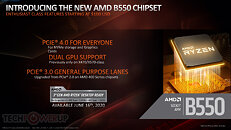
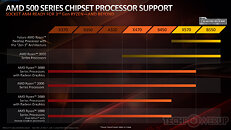
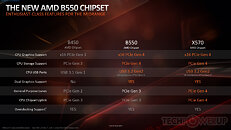
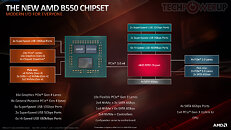
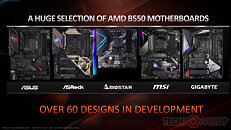
434 Comments on AMD B550 Chipset Detailed, It's Ready for Zen 3, Older AM4 Motherboards not Compatible
(didn't read previous posts here, sorry)
@oxidized I think you need to get a grip mate soo emotional, damn AMD for innovation damn AMD for not having the foresight to tell us Exactly what's occuring in three years.
Wtaf mate show me an example of any company being that specific about a product three to four no,,, find one that specific even a year ahead of them even f#£ing designing it, please do.
this reflects on AMD as a collective whole. this news is the just the nail in the coffin for me. so time for z490 and ampere, stability and quality. as history has shown.im thankful for AMD for kickstarting competition, time to go back to quality though.
I think AMD doesn't want the uncertainty of saying 'your motherboard may or may not support 4th gen Ryzen', so it is easier to draw a hard line at X570/B550 yes, everything else no'. I'm confident though that the vast majority of X470's and B450 boards will get support, 1) because history has shown us that is generally the case, and 2) 4th gen remains electrically and physically compatible to AM4.
Shout me up when you , no don't.
If you have to buy a new motherboard for a CPU 2 years after the first iteration, then you are no better then intel. Ryzen came out the same year as LGA 1151, and now the same time Intel is moving to a new socket those earlier AMD customers have to buy new motherboards too, and dont even get the potential benefits of having a new socket, like better power delivery or more PCIe lanes.
The difference here is Intel tells you up front they are going to punch you in the face, AMD pretends to befriend you only to hit you on the back of the head with a wrench. There are plenty of AMD customers, myself included, that would not have bought into AM4 if they know the generation would be segmented like this, how curious AMD didnt bother defining this until the last generation was ready. Curious.....Almost like they were squeezing money out of their customers before spitting in their face. (after all, the 4 year support was NOT defined as "for manufacturers only" and never did AMD say "you wont be able to use 4000 series chips on 300 and 400 series motherboards". How....convenient for them.)I wonder how many node changes AMD will need before AMD fanboys admit AMD still cant match Skylake in gaming performance.
Both companies milk their fanbases, but when they twist the nipples after milking, they get a very negative reaction.